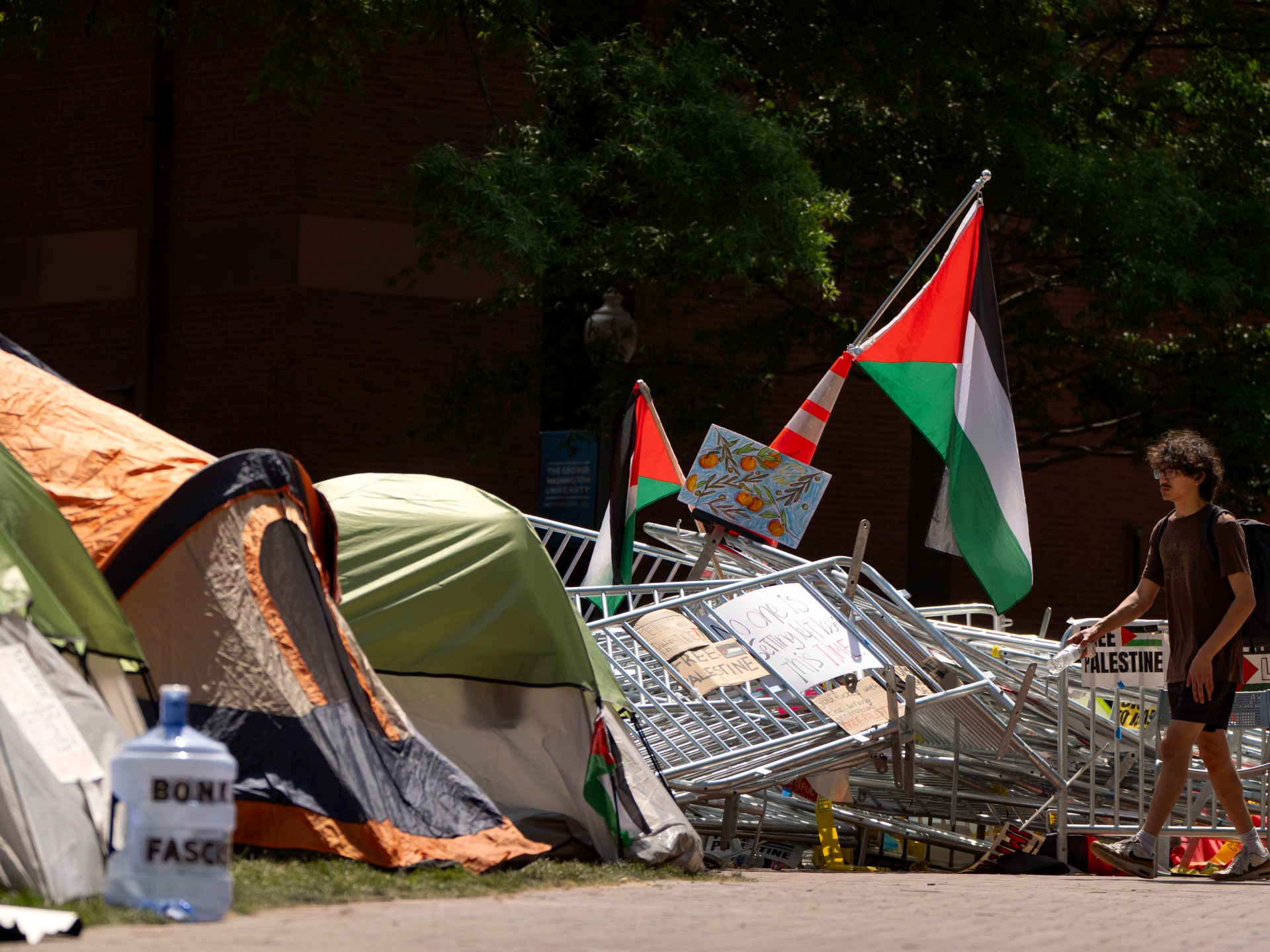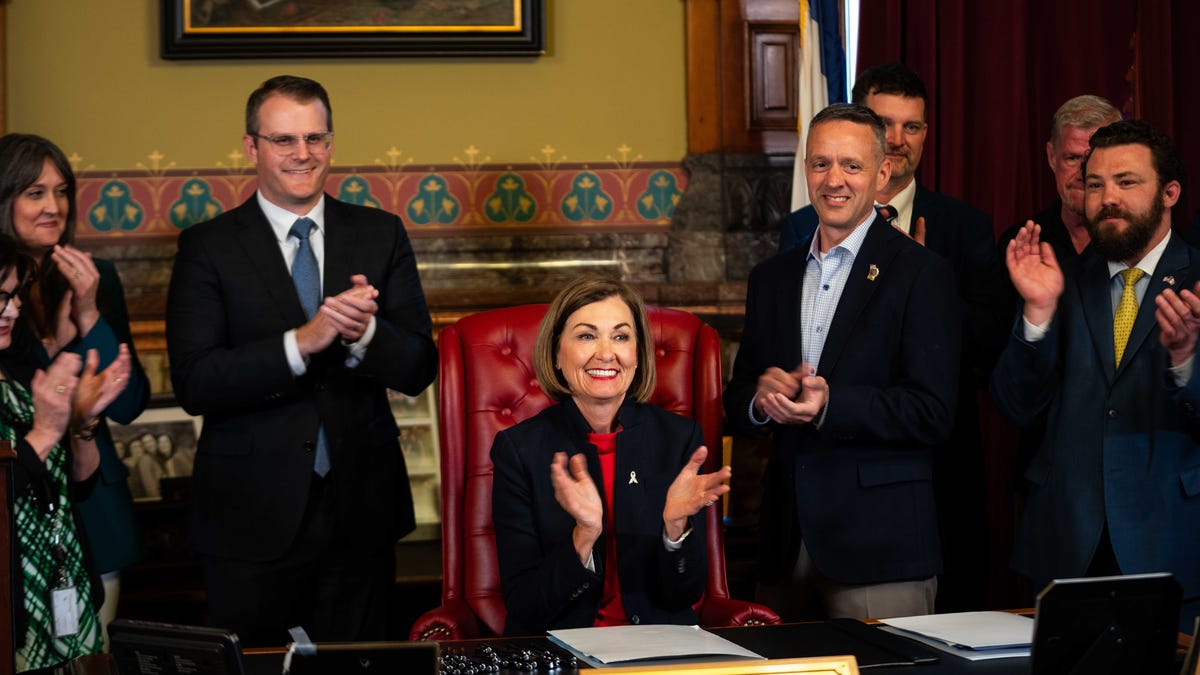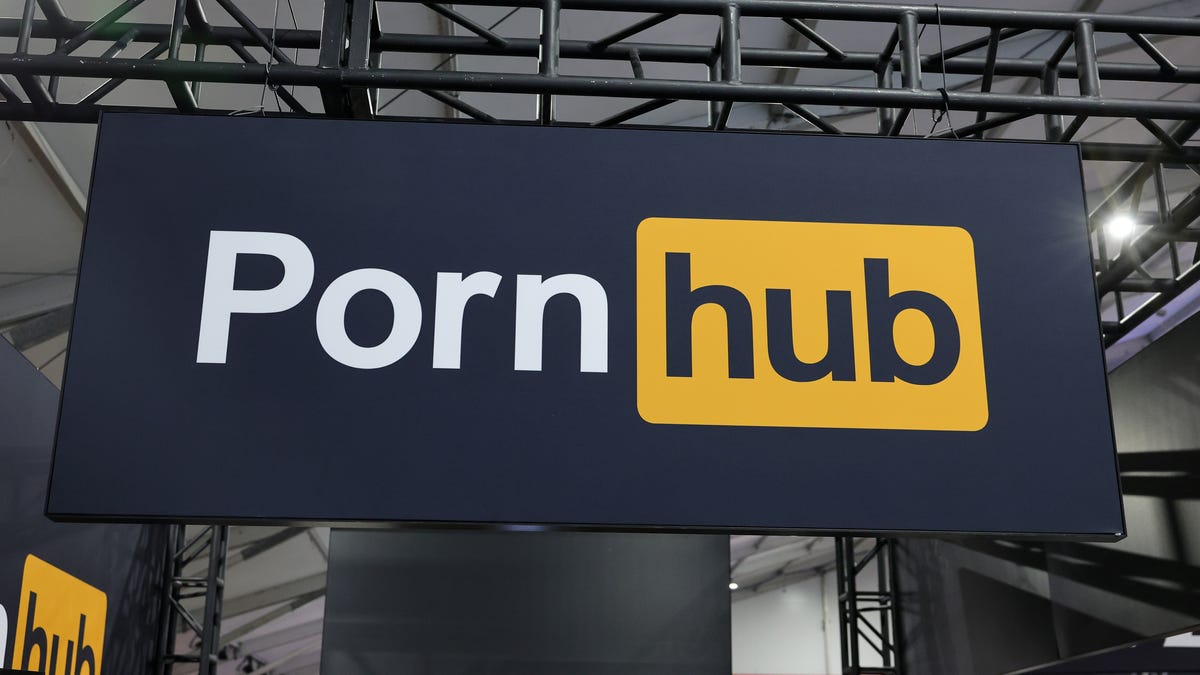World
Nearly half of US states join GOP lawsuit challenging new EPA rule on deadly soot pollution
WASHINGTON (AP) — Twenty-four Republican-led states filed a lawsuit Wednesday challenging a new Biden administration rule that sets tougher standards for deadly soot pollution.
Republicans, led by attorneys general from Kentucky and West Virginia, say the new Environmental Protection Agency rule would raise costs for manufacturers, utilities and families and could block new manufacturing plants and infrastructure such as roads and bridges.
“The EPA’s new rule has more to do with advancing President (Joe) Biden’s radical green agenda than protecting Kentuckians’ health or the environment, said Kentucky Attorney General Russell Coleman, who is leading the lawsuit along with West Virginia Attorney General Patrick Morrisey.
The EPA rule “will drive jobs and investment out of Kentucky and overseas, leaving employers and hardworking families to pay the price,” Coleman said.
The soot rule is one of several EPA dictates under attack from industry groups and Republican-led states. The Supreme Court heard arguments last month on a GOP challenge to the agency’s “good neighbor rule,” which restricts smokestack emissions from power plants and other industrial sources that burden downwind areas.
Three energy-producing states — Ohio, Indiana and West Virginia — challenged the rule, along with the steel industry and other groups, calling it costly and ineffective. The rule is on hold in a dozen states because of the court challenges.
In opposing the soot rule, Republicans say the United States already has some of the strictest air quality standards in the world — tougher than the European Union or major polluters such as China and India.
Tightening U.S. standards “wouldn’t improve public health, but it would put as many as 30% of all U.S. counties out of compliance under federal law, leading to aggressive new permitting requirements that could effectively block new economic activity,’’ they said.
The EPA rule sets maximum levels of fine particle pollution — more commonly known as soot — at 9 micrograms per cubic meter of air, down from 12 micrograms established a decade ago under the Obama administration.
Environmental and public health groups hailed the rule as a major step to improve the health of Americans, including future generations. EPA scientists have estimated exposure at previous limits contributed to thousands of early deaths from heart disease and lung cancer, along with other health problems.
EPA Administrator Michael Regan said the new soot rule, finalized last month, would create $46 billion in net health benefits by 2032, including prevention of up to 800,000 asthma attacks and 4,500 premature deaths. The rule will especially benefit children, older adults and those with heart and lung conditions, Regan said, as well as people in low-income and minority communities adversely affected by decades of industrial pollution.
“We do not have to sacrifice people to have a prosperous and booming economy,″ Regan said.
Biden is seeking reelection, and some fellow Democrats have warned that a tough new soot standard could harm his chances in key industrial states such as Pennsylvania, Michigan and Wisconsin.
The EPA and White House officials brushed aside those concerns, saying the industry has developed technical improvements to meet previous soot standards and can adapt to meet the new ones. Soot pollution has declined by 42% since 2000, even as the U.S. gross domestic product has increased by 52%, Regan said.
The new rule does not impose pollution controls on specific industries. Instead, it lowers the annual standard for fine particulate matter for overall air quality. The EPA will use air sampling to identify counties and other areas that do not meet the new standard. States would then have 18 months to develop compliance plans for those areas. States that do not meet the new standard by 2032 could face penalties, although EPA said it expects that 99% of U.S. counties will be able to meet the revised annual standard by 2032.
Industry groups and Republican officials dispute that and say a lower soot limit could put hundreds of U.S. counties out of compliance.
The U.S. Chamber of Commerce warned the White House in January that 43% of total particulate emissions come from wildfires, and called the pollution standard “the wrong tool to address this problem.’’
The EPA said it will work with states, counties and tribes to account for and respond to wildfires, an increasing source of soot pollution, especially in the West. The agency allows states and air agencies to request exemptions from air-quality standards due to ”exceptional events,″ including wildfires and prescribed fires.
Besides Kentucky and West Virginia, other states joining the lawsuit include: Alabama, Alaska, Arkansas, Florida, Georgia, Idaho, Indiana, Iowa, Kansas, Louisiana, Mississippi, Missouri, Montana, Nebraska, North Dakota, Ohio, Oklahoma, South Carolina, South Dakota, Tennessee, Utah and Wyoming.

World
University of Tehran professor says protesters at US colleges will support Iran in American conflict
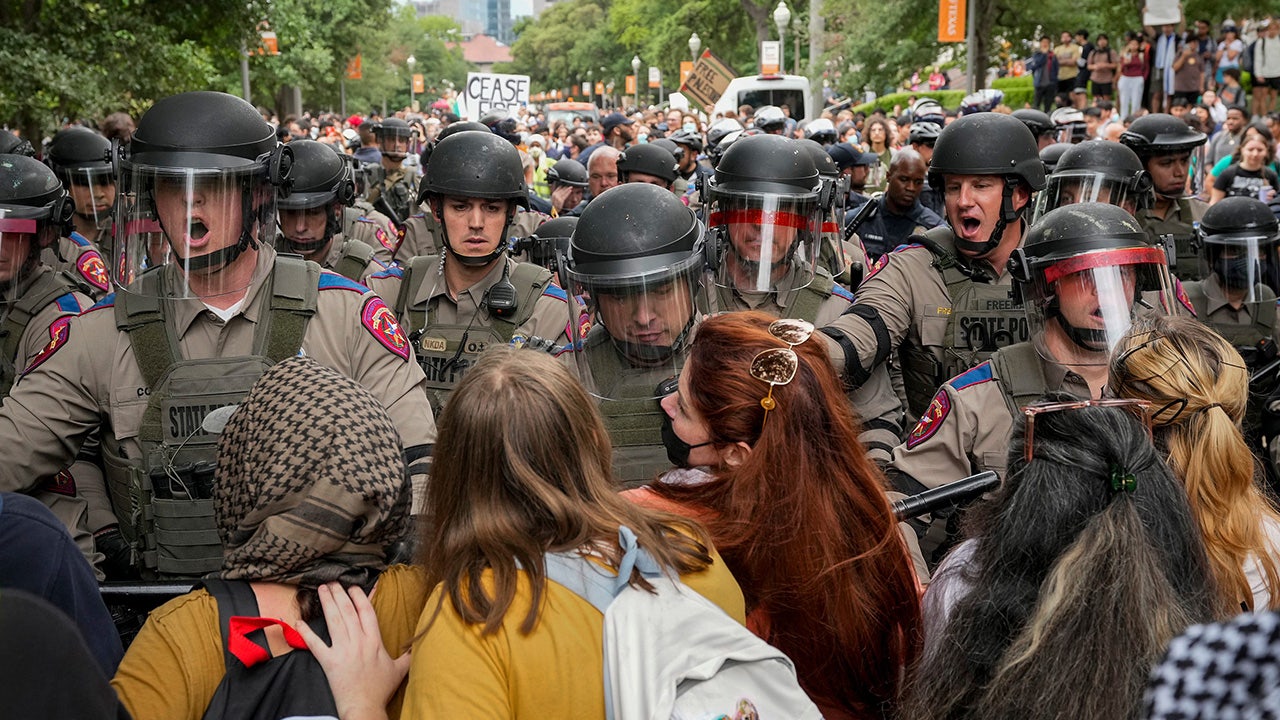
Anti-Israel protests erupt at Fordham University
Fox News correspondent Alexis McAdams reports on anti-Israel protests at Fordham University and the aftermath of NYPD officers clearing out protesters from Columbia University’s Hamilton Hall on ‘Special Report.’
A University of Tehran professor said in an interview that Iran likes seeing protests on U.S. college campuses, adding those are their supporters if there is ever a conflict between the two countries.
Professor Foad Izadi, who, according to the University of Southern California Center on Public Diplomacy, earned his master’s degree from the University of Houston, was seen in a video being interviewed about the protests in the U.S.
“Sooner or later, this kind of support for the Zionist regime by the American regime will diminish. It might not stop completely, but its diminishing is important,” he said. “This is why the demonstrations [on U.S. campuses] are important.”
Izadi spoke as a member of the Islamic Republic, and oftentimes said, “we,” referring to him and the republic.
TRUMP SAYS 4 WORDS ABOUT ANTI-ISRAEL PROTESTS ON COLLEGE CAMPUSES AS ARRESTS SKYROCKET
State troopers in riot gear try to beak up an anti-Israel protest at the University of Texas on Wednesday, April 24, 2024. (Jay Janner/American-Statesman)
“We are watching the demonstrations and like what we see, but it should not end with this,” Izadi said. “If not for the Islamic Republic, the case of the Palestinian idea would have been closed years ago. The idea of resistance belongs to Iran, but on the operational level, when it comes to recruiting connections and building networks, the [Iranian] state has not been involved in a sufficient level.
“These (American students) are our people,” he continued. “If tensions between America and Iran rise tomorrow or the day after, these are the people who will have to take to the streets to support Iran.”
Izadi said there are Hezbollah-style groups in the U.S. that are much larger than those in Lebanon.
VIDEO SHOWS ANTI-ISRAEL PROTESTERS BLOCK JEWISH STUDENT FROM GETTING TO CLASS; UCLA RESPONDS
“America is the Great Satan and our main enemy, but we have hope in these areas,” he said.
Iran expert and Foreign Desk Editor-in-Chief Lisa Daftari provided insight on Izadi’s comments.
“Quite rich to see the same regime that is fixated on torturing, raping, blinding, executing its own college students, is applauding the ignorant college students on American campuses,” she said. “It speaks to their focus on growing their influence outside of Iran.”
UCL ANTI-ISRAEL PROTESTERS ASK SUPPORTERS FOR VEGAN AND GLUTEN-FREE FOOD, ZIP TIES, SHIELDS AND EPIPENS
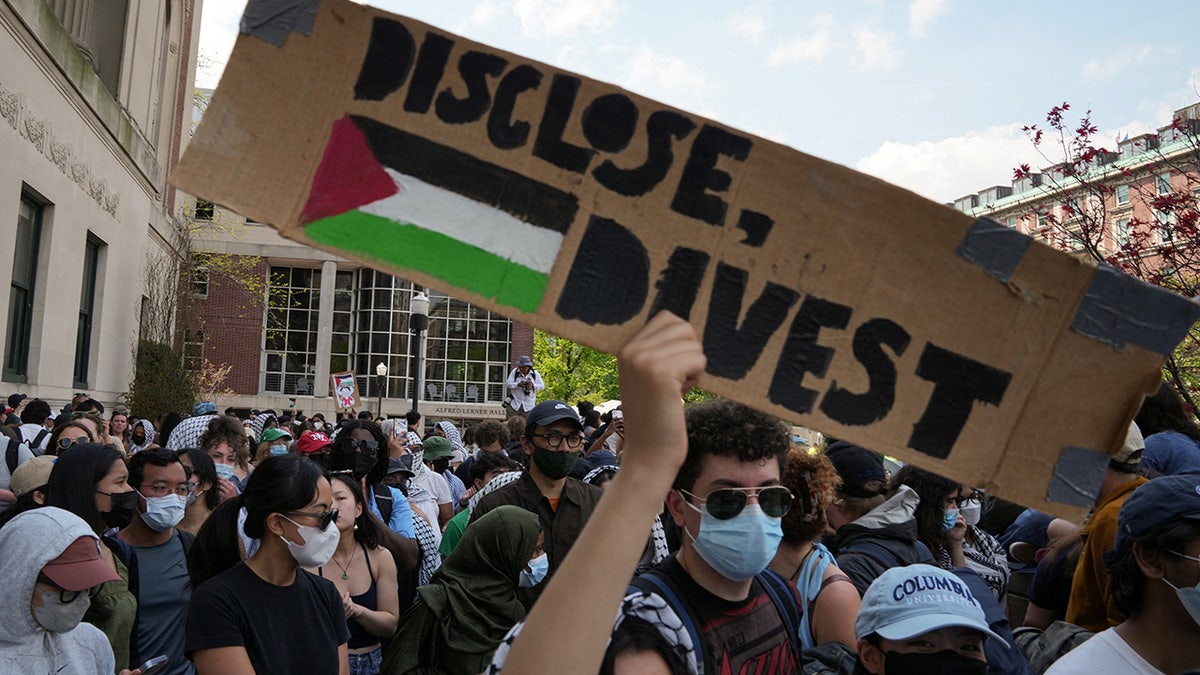
A protester holds a sign during a march on Columbia University campus in support of a protest encampment supporting Palestinians in New York City, April 29, 2024. (REUTERS/David Dee Delgado)
Daftari explained that Iran has been beefing up terror proxies in the region and paying their way into American universities.
But at the same time, she said, the Iranian people have suffered under the rule of their “barbaric” leaders.
After watching the comments, Daftari also said it was interesting to hear Izadi say they have more Hezbollah followers in the U.S. than in Lebanon.
“Regardless of when these pro-Hamas protests quiet down here in the U.S., it’s apparent the regime has its sights set on manipulating this momentum to launch more attacks here in the West,” she said. “The question then remains will they focus on a physical attack or just the information war, or both?”
World
France's May Day march turns into political arena ahead of EU election

Many left-wing contenders didn’t miss the opportunity to attend the traditional May Day protest in Paris, while the far-right politician Jordan Bardella, currently leading the polls, announced the rest of his candidate list in southwestern France.
The usual chants for higher salaries and equal pay echoed across the streets of Paris this Wednesday during the traditional May Day labour rights march.
Ten of thousands of protestors took to the streets of the French capital against a backdrop of new demands such as peace in Gaza and against the upcoming Paris Olympic Games.
But with less than six weeks left before the European elections on 9 June, the event turned into a highly political one.
Many left-wing candidates didn’t miss the opportunity to present their campaign, all vying for attention.
Representing the Communist party for the EU elections, Léon Deffontaine, the 28-year-old candidate is focusing his campaign on energy bills — a topic that catalysed numerous protests in France and Europe since Russia’s full-scale invasion of Ukraine.
“The first measure I want to put in place is to take France out of the European electricity market to reduce energy bills. Today, we’re paying far more than the price we pay to produce electricity,” he told Euronews.
Others emphasised the importance of protesting the rise of the far-right, currently leading the polls, represented by Jordan Bardella of the Rassemblement National party (RN).
“May 1st is also an opportunity to remember that we must always fight against these anti-democratic, anti-republican parties that unfortunately swarm our country,” said Marie Toussaint, leader of the Green Party for the 9 June elections.
According to a poll by IPSOS ordered by Euronews, Macron’s centrist alliance Renaissance is lagging by 15 points behind Bardella’s party.
Meanwhile, in the southwestern city of Perpignan, Jordan Bardella gathered more than 2,000 people to announce his party’s first 35 candidates for the elections.
These include candidates such as Fabrice Leggeri, ex-boss of Frontex, the European Border and Coast Guard Agency.
End of April, two NGOs filed a civil complaint against Leggeri accusing him of being complicit in crimes against humanity for enabling ‘pushback’ of boats full of illegal migrants between 2015 and 2022.
Bardella’s move was highly criticised by left-wing parties, claiming the far-right politician was taking away the attention from worker’s issues.
“Taking advantage of May 1st to launch a campaign shows that he couldn’t care less about French workers,” reacted Léon Deffontaines, the Communist candidate.
In Saint-Etienne (near Lyon), the head of the socialist party, Raphaël Glucksmann, was prevented from joining the march.
Multiple protesters threw paint and eggs at the EU election candidate, currently third in the polls after the far-right and Marcon’s centrist alliance.
In total, about 121,000 people marched across France according to the Ministry of the Interior, while the main labour union CGT claimed “more than 210,000” participated in the marches in the country.
World
New Russia sanctions target weapons development and countries assisting in sanctions evasion
WASHINGTON (AP) — The U.S. on Wednesday imposed new sanctions on hundreds of firms and people tied to Russia’s weapons development program, more than a dozen Chinese firms accused of helping Russia find workarounds to sanctions and individuals tied to the death of Russian dissident Alexey Navalny.
The sanctions imposed by the Treasury and State departments target Russia’s military-industrial base, chemical weapons programs and people and firms in third countries that help Russia acquire weapons components as its invasion of Ukraine has entered its third year.
Treasury Secretary Janet Yellen said the action “will further disrupt and degrade Russia’s war efforts by going after its military industrial base and the evasion networks that help supply it.”
The sanctions come as the Senate gave final approval to legislation barring imports of Russian uranium, boosting U.S. efforts to disrupt Russia’s war in Ukraine. President Joe Biden is expected to sign the bill into law.
About 12% of the uranium used to produce electricity at U.S. nuclear power plants is imported from Russia, according to the U.S. Energy Information Administration.
A spokesperson for the National Security Council said Wednesday that Biden, a Democrat, shares lawmakers’ concerns about U.S. reliance on Russia for low-enriched uranium to support its domestic nuclear fleet.
Included in Wednesday’s sanctions announcement are importers of cotton cellulose and nitrocellulose — used to produce gunpowder, rocket propellants and other explosives. Also included are Russian government entities and people tied to Russia’s chemical and biological weapons programs and firms related to Russia’s natural gas construction projects.
Russian President Vladimir Putin has repeatedly railed against several rounds of U.S. and Western sanctions, claiming last year that they are “illegitimate sanctions” on his country.
A group of 16 targets in China and Hong Kong, most of which are related to Russian procurement workarounds, are also included in the latest sanctions announcement.
Firms in countries including China, Azerbaijan, Belgium, Slovakia, Turkey and the United Arab Emirates are accused of helping Russia acquire technology and equipment from abroad. The penalties aim to block them from using the U.S. financial system and bar American citizens from dealing with them.
The sanctions come after Biden last week said he would immediately rush badly needed weaponry to Ukraine as he signed into law a $95 billion war aid measure that also included assistance for Israel, Taiwan and other global hot spots.
Yellen said with the sanctions and supplemental funding combined, “our support for Ukraine and our relentless targeting of Russia’s military capacity is giving Ukraine a critical leg-up on the battlefield.”
-

 Education1 week ago
Education1 week agoVideo: Dozens of Yale Students Arrested as Campus Protests Spread
-

 World6 days ago
World6 days agoHaiti Prime Minister Ariel Henry resigns, transitional council takes power
-

 News7 days ago
News7 days agoLarry Webb’s deathbed confession solves 2000 cold case murder of Susan and Natasha Carter, 10, whose remains were found hours after he died
-

 Politics1 week ago
Politics1 week agoFetterman hammers 'a–hole' anti-Israel protesters, slams own party for response to Iranian attack: 'Crazy'
-

 World1 week ago
World1 week agoPeriod poverty still a problem within the EU despite tax breaks
-

 World7 days ago
World7 days agoUS secretly sent long-range ATACMS weapons to Ukraine
-

 News6 days ago
News6 days agoFirst cargo ship passes through new channel since Baltimore bridge collapse
-

 World1 week ago
World1 week agoTurkey’s Erdogan meets Iraq PM for talks on water, security and trade
